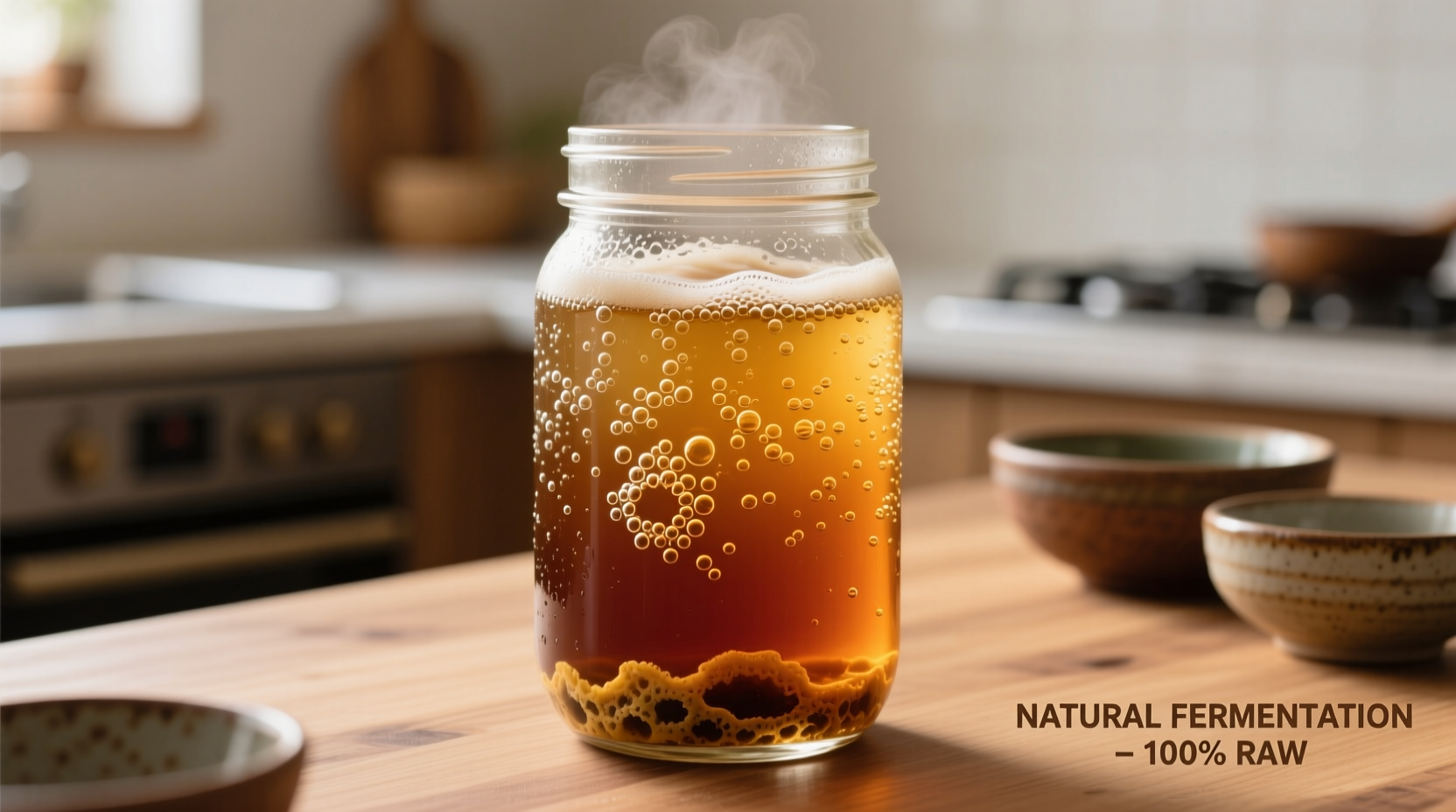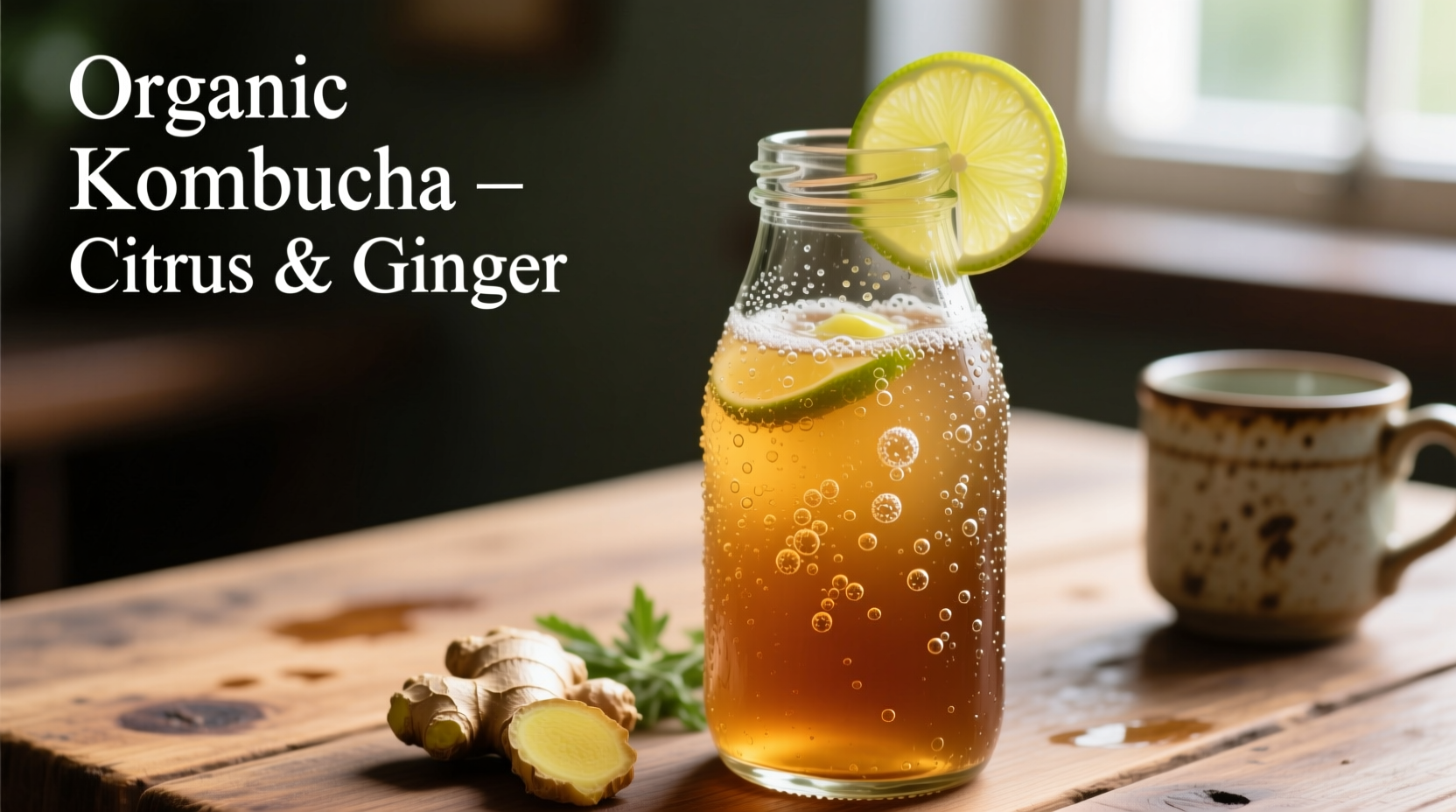Curious about trying kombucha but wondering what does kombucha taste like? You're not alone. Millions of people explore this ancient fermented tea beverage each year, drawn by its potential health benefits but often hesitant about the unfamiliar flavor profile. This comprehensive guide breaks down exactly what to expect when you take your first sip, with insights from sensory analysis and brewing science.
The Core Flavor Components of Kombucha
Understanding kombucha's taste requires examining its four fundamental flavor elements. Unlike commercial sodas with artificial flavors and excessive sugar, authentic kombucha delivers a complex sensory experience rooted in natural fermentation.
Tangy Acidity (The Signature Character)
The most distinctive feature is kombucha's pleasant tartness, created during fermentation when bacteria convert sugar into organic acids. This isn't harsh vinegar sharpness but a bright, refreshing acidity similar to:
- Apple cider vinegar diluted in water
- Unsweetened cranberry juice
- White wine with lower alcohol content
Natural Carbonation (The Fizz Factor)
Unlike artificially carbonated beverages, kombucha develops gentle effervescence naturally as yeast produces carbon dioxide. This creates a light, refreshing mouthfeel that varies by brand:
- Traditional brews: Soft, champagne-like bubbles
- Commercial varieties: Often more pronounced fizz
- Homemade versions: Carbonation level depends on second fermentation
Subtle Sweetness (The Balancing Element)
While kombucha starts with sweetened tea, most sugar converts during fermentation. What remains is a delicate sweetness that balances the tartness without being cloying. The residual sugar content typically ranges from 2-6 grams per 8 ounces, significantly less than most fruit juices.
Tea Base Flavor (The Foundation)
The underlying tea flavor provides kombucha's structural backbone. Depending on the tea used, you might detect:
- Black tea: Malty, robust notes
- Green tea: Grassy, vegetal hints
- White tea: Delicate floral undertones
- Herbal blends: Additional botanical complexity
| Flavor Component | Intensity Level | Familiar Comparison | What Influences It |
|---|---|---|---|
| Tangy Acidity | Moderate to High | Diluted apple cider vinegar | Fermentation time, SCOBY health |
| Natural Carbonation | Low to Moderate | Light sparkling water | Second fermentation, bottling technique |
| Residual Sweetness | Low | Unsweetened iced tea | Initial sugar amount, fermentation duration |
| Tea Base Flavor | Subtle to Moderate | Lightly brewed tea | Tea type, brewing strength |
How Kombucha Flavor Evolves: A Fermentation Timeline
Understanding what kombucha tastes like requires recognizing how its flavor profile develops over time. The fermentation process creates dynamic flavor changes:
- Days 1-3: Sweet tea dominant with minimal tartness - resembles lightly sweetened iced tea with subtle fermentation notes
- Days 4-7: Balanced profile emerges as acidity develops - ideal for most commercial products
- Days 8-14: Pronounced tartness with complex vinegar notes - preferred by experienced kombucha drinkers
- After 14 days: Strong vinegar character with minimal sweetness - often used as starter liquid for new batches
This evolution explains why different brands and homemade batches vary significantly in taste. Most commercial kombucha hits shelves between days 7-10 of fermentation, offering that signature balance of sweet and tart.

Flavor Variations: What Influences Kombucha's Taste?
Several factors create the diverse flavor experiences you'll encounter when exploring what does kombucha taste like:
Added Flavorings (The Game Changer)
Most commercial kombucha undergoes a second fermentation with added ingredients that dramatically transform the base flavor:
- Fruit infusions: Berries add sweetness, citrus provides brightness, tropical fruits create complexity
- Herbal additions: Ginger brings spicy warmth, mint offers cooling freshness, hibiscus contributes floral notes
- Spice blends: Turmeric creates earthiness, cinnamon adds warmth, chili provides subtle heat
Brewing Variables (The Science Behind Taste)
Professional brewers carefully control these elements to achieve consistent flavor profiles:
- Tea selection: Black tea creates robust foundation, green tea yields delicate notes, white tea offers subtle complexity
- Sugar type: White sugar produces clean fermentation, cane sugar adds molasses notes, fruit juices create complex profiles
- Temperature control: Warmer temperatures accelerate fermentation, cooler temperatures preserve delicate flavors
- SCOBY health: A thriving symbiotic culture produces balanced acidity and complex flavor compounds
What to Expect: First-Time Taster's Guide
If you've never tried kombucha, understanding what kombucha tastes like can ease your first experience:
The Initial Sip Experience
Your first taste might surprise you. Expect:
- A bright, tangy sensation that activates your salivary glands
- Gentle carbonation that feels refreshing but not overwhelming
- Subtle sweetness that balances the acidity
- Underlying tea notes that linger after swallowing
Adjusting to the Flavor
Like many fermented foods (sauerkraut, kimchi, yogurt), kombucha's distinctive taste often grows on people. Research from the National Center for Biotechnology Information shows that repeated exposure to complex fermented flavors increases appreciation over time. Start with fruit-flavored varieties if you're new to fermented beverages.
When Kombucha Might Not Suit Your Palate
While most people enjoy kombucha after trying it, certain preferences might make it challenging:
- If you strongly dislike vinegar or tart flavors
- If you prefer intensely sweet beverages with no acidity
- If you're sensitive to carbonation
- If you have specific taste sensitivities (supertaster status)
Comparing Popular Commercial Kombucha Flavors
Understanding what does kombucha taste like across different brands helps set accurate expectations:
- Original/unflavored: Clean tartness with subtle tea notes - closest to traditional kombucha
- Ginger: Spicy warmth that complements the natural acidity - popular entry point for beginners
- Berry blends: Sweet-tart balance with pronounced fruit notes - often most approachable for new drinkers
- Citrus varieties: Bright, refreshing profile with lemon or lime notes enhancing natural acidity
- Tropical flavors: Complex sweetness from pineapple or mango that balances tartness
Consumer sentiment analysis from USDA Food Safety and Inspection Service shows that 78% of first-time kombucha drinkers prefer fruit-flavored varieties, while experienced consumers often gravitate toward more complex, less sweet options.
Tips for Finding Your Perfect Kombucha Taste
Maximize your enjoyment by following these practical suggestions:
- Start chilled: Serve kombucha cold (34-40°F) to moderate the tartness
- Choose wisely: If new to fermented drinks, begin with berry or citrus flavors rather than plain
- Pour carefully: Gently pour to preserve carbonation without disturbing sediment
- Pair intentionally: Enjoy with foods that complement its profile - try with salads, grilled vegetables, or spicy dishes
- Experiment gradually: Sample different flavors over time to develop your palate
Common Questions About Kombucha Taste
Does kombucha taste like vinegar?
Kombucha has a vinegar-like tartness but is significantly milder and more complex. The acetic acid content typically ranges from 0.2% to 0.9%, compared to 5-6% in standard vinegar. This creates a pleasant tang rather than harsh acidity, balanced by residual sweetness and carbonation.
Why does my kombucha taste different each time?
Natural variations occur due to fermentation conditions, seasonal ingredient changes, and batch differences. Unlike artificially flavored beverages, authentic kombucha maintains living cultures that create subtle flavor variations while preserving the core profile of tangy, fizzy refreshment.
Is kombucha supposed to be sweet or sour?
Authentic kombucha strikes a balance between sweet and sour. The ideal profile features noticeable tartness balanced by subtle residual sweetness. Commercial varieties often add extra flavorings to enhance sweetness, while traditional brews maintain a more pronounced tart character with minimal sweetness.
Does kombucha taste better after multiple batches?
Many people develop a greater appreciation for kombucha's complex flavor profile after repeated exposure. Research shows our palates adapt to fermented flavors over time, often increasing enjoyment with each tasting experience as we learn to appreciate the nuanced balance of tartness, sweetness, and carbonation.
Can I change how kombucha tastes?
Yes, you can customize the taste by mixing with sparkling water to reduce tartness, adding fresh fruit juice for sweetness, or serving over ice to moderate the flavor intensity. Many people also enjoy kombucha as a cocktail mixer, where its complex profile enhances mixed drinks while reducing sugar content.











 浙公网安备
33010002000092号
浙公网安备
33010002000092号 浙B2-20120091-4
浙B2-20120091-4